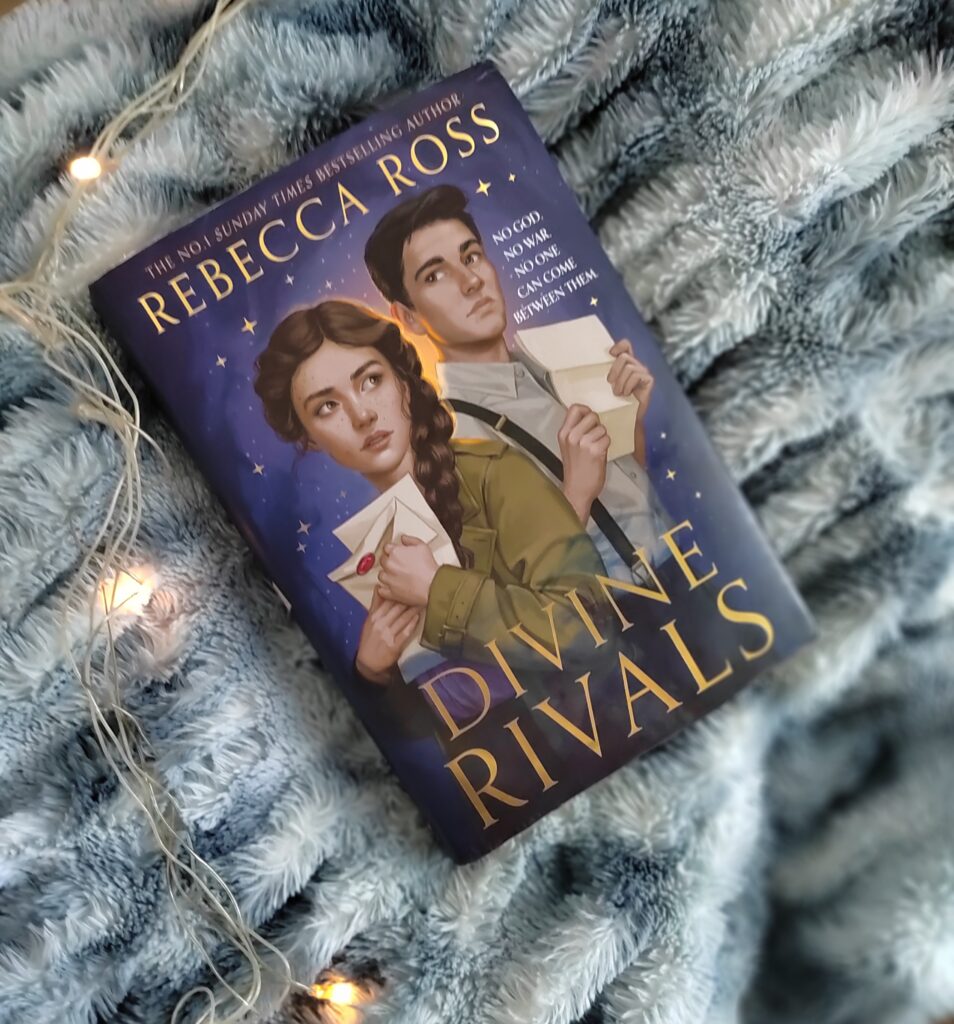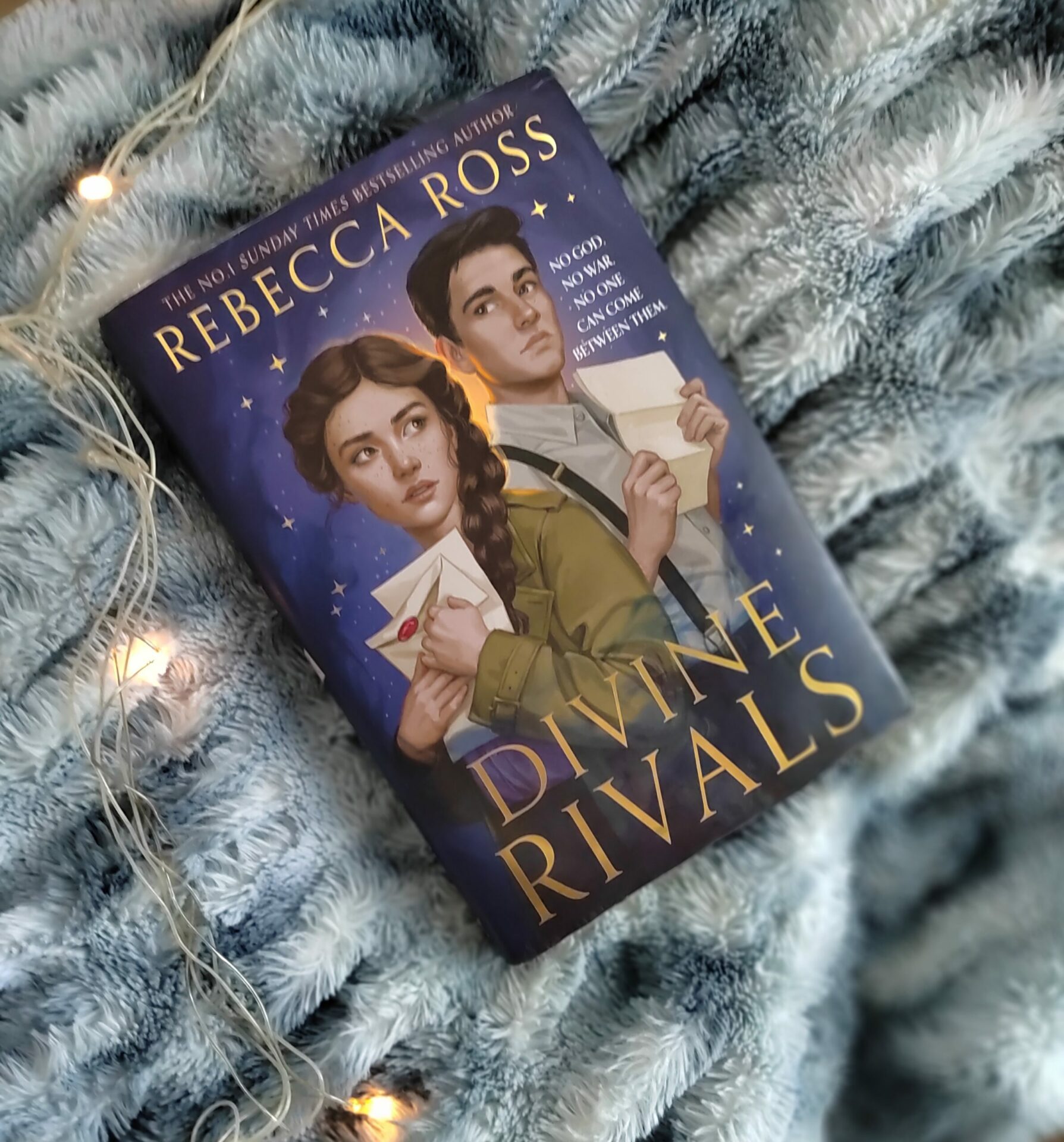Divine Rivals Review: Boring and Disappointing
| 📖 Genre | Fantasy, Romance, Young Adult |
| 📃 Number of Pages | 357 pages |
| 🪴 Average Goodreads Rating | 4.26 ⭐ |
| 🌻 My Rating | 2 ⭐ |
What is Divine Rivals About?
Divine Rivals follows Iris, a young woman whose brother went off to war (between gods), and whose mother turned to drinking. To get money, she leaves school and gets a job at a newspaper, where she competes for the columnist position with Roman Kitt. At the same time, she’s writing letters to her brother and hiding them in her wardrobe, and they magically appear with Roman. He writes her back but doesn’t tell her who he is. When Roman gets the columnist position and Iris’ mother dies, she decides to become a war reporter and find her brother. And Roman follows her to the front.

Unfortunately, I was not a fan of this book. So much so that I had to DNF (Do Not Finish) it at around 60% and my rating for what I read so far would be 2 stars if I’m generous. So if you liked this book, please look away, this is about to get ugly.
Writing Style/Prose
My biggest issue with this book is its prose, which I didn’t expect at all. I’ve already read A River Enchanted by the same author and the writing was really good. It was somewhat cinematic and lyrical in a way that worked. So I thought that this book would at least have that.
However, that was not the case. The writing in this book felt very stilted, dry, and robotic. The author tried to make it poetic, but it didn’t quite work. The dialogue was very strained as well. I feel like the author tried to force these characters to speak like people from the 1940s would, but again, it wasn’t successful. The characters kept calling each other by their last names in every single line. It’s a bit like this:
“What are you up to, Winnow?”
“None of your business, Kitt.”
“It is my business, Winnow, because you are my competition.”
“Get lost, Kitt.”
And on and on it went. Not just between the two main characters, mind you, but between all of the characters.
Finally, the letters. I had such high hopes for this element of the book because I love epistolary novels, as rare as they are. But I was once again disappointed because the letters sounded as if my twelve-year-old self had written them in her diary.
Overall, the writing is all tell, no show, and it felt very much like writing. I don’t know how better to explain it, but I was aware the entire time that I was reading words on paper, and I was not at all pulled into the story.
World Building
Now, I knew in advance that the world-building was not the best, and I thought I could live with it. Turns out, I cannot. Literally, none of it makes sense. There are enchanted buildings, but why or how they’re enchanted and who enchanted them, we do not know. They get mentioned once or twice, then never again. Are there different enchantments? Or is it just one enchantment and then the building behaves how it wants?
There are two enchanted typewriters (that Iris and Roman own), which work like this: you type out a letter, shove it in your wardrobe and it flies out of the other person’s wardrobe. But why? What do the wardrobes have to do with the typewriters?
Wouldn’t it make more sense for the typewriters to have an additional button that would make the message from one typewriter appear on the paper in the other typewriter? Or like a secret word/spell that would send the message. Makes no sense. And why aren’t more typewriters enchanted? Wouldn’t it make sense if it’s possible in this world? Are there sorcerers or wizards in this world? Who does the magic?
There are a bunch of gods, but none of them are explained well. Two of them are at war, but the story is just ridiculous and nonsensical. There are terrible monsters but those are easily avoided if you turn off the lights and sit still. So, the stakes are virtually none.
World Building Delivery
And the worst of it is how the world-building was delivered to us — either through long, overly poetic letters or through long monologues from random characters. For example, Iris goes to apply for a job and brings her typewriter. Her new editor sees it and takes the time to tell her the full story and lore behind the typewriters in one long monologue. For no good reason. While there’s a war going on, Iris has half an hour to get ready and get on the train that would take her to the front.
Plus, the aesthetic of this world is… weird. It’s meant to have very 1940s, Casablanca, and My Girl Friday vibes (that much is obvious), but it also feels like the author wanted a bit of Howl’s Moving Castle in there as well.
I could have been okay with all of that, if only the romance was halfway decent. But it was not.
The Romance/Characters
The two main characters are meant to be office rivals, which is always fun. However, their rivalry is not explored that well. We meet them when they have already been working together for a few months, which ruins the effect.
Their relationship is not that strained, though. Iris invites him out for lunch/dinner, and on a different occasion he accepts. When her boss gives him the promotion, he defends her and asks for more time for her. When she runs out of the office, he goes to her home to give her the coat she left behind. She helps him with his article. So, they’re not really rivals or enemies.
There’s also the fact that Iris can’t even look at Roman without talking about how handsome he is, and shivering when he looks at her. And when we get to Roman’s POV, it’s clear he’s in love with her. Plus, everyone in the office wants them to be together.
Despite all of this, the author makes Iris do mental gymnastics to spin the nice things Roman does for her into something bad. Like, when he tries to stop her from quitting her job, she somehow figures out that it’s because he’ll miss the competition.
Pen Pals
We also have the pen pal aspect. So, as mentioned, Iris has been writing letters to her brother on the front, and shoving them into her wardrobe for some contrived reason. They kept disappearing, so she assumed he was getting them (somehow). Instead, they were going to Roman (again, for a very contrived reason revealed later).
He keeps them for a while and says nothing, even though he knows immediately it’s Iris. In these letters, she talks about how horrible her life is, how poor she is, how much her mother drinks. And then Roman, the genius that he is, keeps wondering why she’s late for work or why she looks like she hasn’t slept.
At one point, he replies to her letters and tells her he’s not her brother, but doesn’t reveal his identity because reasons. And they keep writing to each other, but the letters abruptly turn very personal without them earning it.
It doesn’t help that they both have the personalities of limp noodles. Yes, they want to be writers (questionable, considering their skills), and they’re pretty in a conventional way but what else?
The other characters exist, but are mostly there to fill up the world. Iris is meant to be interviewing these soldiers at war, writing stories about the front, but she does none of it. There’s zero focus on that, or on the war itself — everything is just backdrop for the romance between Iris and Roman.
Also, plot points are dropped and never mentioned again. I’m assuming for the sake of the second part of the duology, but it’s still grating. For example, the job for which Iris and Roman were competing, all mentions of it just go away, which is weird considering how important it was.
Divine Rivals Review: Final Thoughts
This book would have been much better if the story was firmly set at the front. Iris and Roman still could have been rivals, one writing for one newspaper, one for the other, both trying to write the best stories. They could have connected with the soldiers, and become friends with them (which would make the whole war situation feel very close and scary). And they could have connected through their shared experiences with war and writing. That would have been impactful. As it is, Divine Rivals just exists.
All in all, I was so bored at one point, that I was distracted by freaking Peppa Pig playing on my TV for the thousandth time. I’m sorry to everyone who liked this book, I really hoped to like it, but it just was not for me at all.








4 Comments